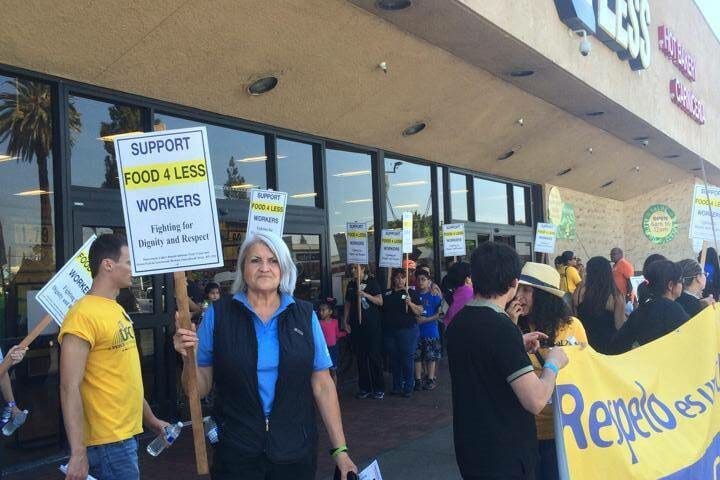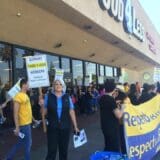


The latest sign that the nation’s 14-year romance with the for-profit cyber charter industry might be cooling came last week when the Board of Trustees for Pennsylvania’s scandal-plagued Agora Cyber Charter School discussed completely severing its relationship with K12 Inc., the nation’s largest for-profit cyber charter management and curriculum supplier.
The action came nearly three weeks after an August 5 vote by Agora’s board to not renew its management contract with the online learning giant beginning with the 2015-16 school year.
Agora had been the jewel of K12’s 29-state network of virtual charters, accounting for 14 percent of the company’s annual revenues of $848.2 million. So when news of the August 5 decision came to light during an August 14 K12 Fourth Quarter investor conference call, it sent K12’s high-performing stock into a nearly 13-point tailspin. The call-in’s moment of revelation can be heard here:
» Read more about: Cyber Charter School Revolt Against K12 Inc. Continues »



Whenever the subject of raising hourly pay to a livable level comes up in Los Angeles, you can expect two stalwart foes: The Chamber of Commerce and the Central City Association. They both represent business and they always argue that paying working people a wage they can live on will hurt business owners. I cannot recall a time they ever claimed anything else.
But now a new voice from the business community has surveyed the field of low-wage work and come up with a conclusion quite opposite the Chamber’s and the Association’s. A member of the faculty at MIT’s Sloan School of Management (named after a former president of General Motors, no less) compared wages and company results among sales people and check-out clerks. These jobs happen to rank one and two in the number of employees in the country, and they are notorious for low pay, part-time hours and oppressive working environments.

For many, the legacy of Labor Day has been forgotten. We forget about the struggle that so many fought and even died for to achieve decent working conditions. We take for granted that children no longer have to slave away in American factories for 17 hours a day, six days a week. We undervalue what it took to get the weekend. After all, that’s what makes Labor Day such a treat in the first place–we get a three-day weekend instead of the boring old two. And for those of us still lucky enough, the 40-hour work week is just the standard.
Longtime president and founder of the American Federation of Labor, Samuel Gompers said:
“Labor Day differs in every essential way from the other holidays of the year in any country. All other holidays are in a more or less degree connected with conflicts and battles of man’s prowess over man,



35th Annual Labor Day Parade: Join the L.A. labor movement as we celebrate Labor Day weekend!
Monday, September 1
Parade begins 10 a.m., Broad Ave. and E Street
Rally and picnic start noon, Banning Park
Wilmington, CA
Download Flyer
For more information, contact the Labor Day Committee at (562) 595-1891
Labor Day Concert with Sheila E, Eric Benet and Irvin Mayfield Quintet
Monday, September 1
Doors open 4 p.m., concert starts 5 p.m.
Conga Room at L.A. Live
Download Concert Flyer. For more information or to purchase tickets, contact Todd Hawkins at todd@thetoddgroup.net or (213) 300-9342.


Assembly Bill 1522, created to give all California workers at least three days of paid sick leave, passed the legislature Friday, but with a key change: In-home health-care workers who assist disabled and elderly Californians will now be excluded from coverage. The compromise resulted in two important union backers of the bill, authored by Assemblywoman Lorena Gonzalez (D-San Diego), to withdraw their support.
According to the Sacramento Bee, “The Service Employees International Union and the American Federation of State, County and Municipal Employees abandoned the bill after it was rewritten to exempt home health-care workers.”
Another closely watched measure, Senate Bill 270, also passed its final hurdle Friday, the Los Angeles Times reports. The bill, authored by senators Alex Padilla (D-Pacoima), Kevin de Leon (D-Los Angeles) and Ricardo Lara (D-Huntington Park/Long Beach), will ban single-use plastic bags in grocery stores and other retail outlets.


In a victory for public safety over private profitability, Senate Bill 1019 passed the state Assembly and Senate with strong bipartisan consent on August 27 and 28. Known as the Consumers’ Right to Know: Flame Retardants in Furniture bill, the measure – introduced by Senator Mark Leno, (D-San Francisco) — requires upholstered furniture manufacturers to disclose to consumers the use or absence of flame retardant chemicals on furniture labels.
“SB 1019 gives consumers what they have demanded for decades—the right to know what is in their furniture and the power to make an informed decision about whether to purchase it,” Leno said in a press statement.
Given SB 1019’s diverse support—from business associations to consumer groups, environmental organizations and labor unions—it appears likely Governor Brown will sign the bill by the September 30 legislative deadline, after which it would take effect January 1, 2015.
Getting business on board with SB 1019 proved to be a critical turning point for the bill.
» Read more about: Public Safety, Worker Protection Bills Advance to Governor’s Desk »


There is a long tradition in the United States, and perhaps most of the world, of binary thinking when it comes to work.


This weekend marks the unofficial end of summer as well as a chance for us to reflect on the achievements of American workers. This year workers across our country have a lot to celebrate, thanks in part to a series of executive orders signed by President Obama.
The Fair Pay and Safe Workplaces Executive Order is particularly important for Americans working for a federal contractor. The Federal government spends $500 billion in taxpayer dollars every year for goods and services provided by federal contractors, but too many are guilty of repeated and flagrant violations that endanger the lives of workers and cheat employees out of pay. Obama’s executive order will keep taxpayer dollars out of these companies’ coffers by requiring all bidders to disclose labor-law violations as far back as three years.
Governors and mayors across the country have an opportunity to follow President Obama’s lead to simultaneously protect contractors and taxpayers.
» Read more about: Labor Day 2014: Fair Pay and Fair Play for Workers »


Food for Less grocery workers and the Kroger Corporation backed away from the edge of a cliff Tuesday, following weeks of a labor standoff. Both sides averted a potentially devastating strike with a tentative labor agreement whose proposed contract covers some 6,500 workers at 90 stores throughout Southern California.
Employees authorized a strike in July and then launched a consumer boycott in the face of Kroger’s threat to slash contributions to medical plans, reduce hours and transfer the work of higher-paid employees to those lower on the wage scale.
In mid-August hundreds of workers turned out on informational picket lines and urged consumers to shop elsewhere. During this time, Kroger recruited strike-busters from Ralphs, another grocery chain it owns.
Why did Kroger refuse to budge? The Cincinnati-based Fortune 500 Company that owns Food 4 Less, Ralphs and Frys recorded a half-billion-dollar profit for the first quarter of 2014,
» Read more about: Food 4 Less Workers Reach Tentative Agreement With Kroger »



Things are heating up inside the state Capitol in Sacramento. As an August 31 deadline for the end of the 2013-14 legislative year looms, union labor is facing off with business forces over the fate of pending laws governing pay, employee benefits and the environment.
A level playing field is not part of the lobbying landscape when it comes to swaying undecided legislators on these bills, said David Huerta, president of Service Employees International Union-United Health Workers West. Huerta told Capital & Main by phone that business lobbyists enjoy a two-to-one numerical advantage over labor representatives under the Capitol dome.
Huerta witnessed that dynamic first hand this pivotal week as business and labor interests met separately with state lawmakers over Assembly Bill 2416, the California Wage Theft Recovery Act.
Introduced by Assemblyman Mark Stone (D-Scotts Valley), AB 2416 would mandate local programs to allow employees to file liens against employers for unpaid wages.
» Read more about: Business Interests Clash With Public’s As Legislative Year Ends »